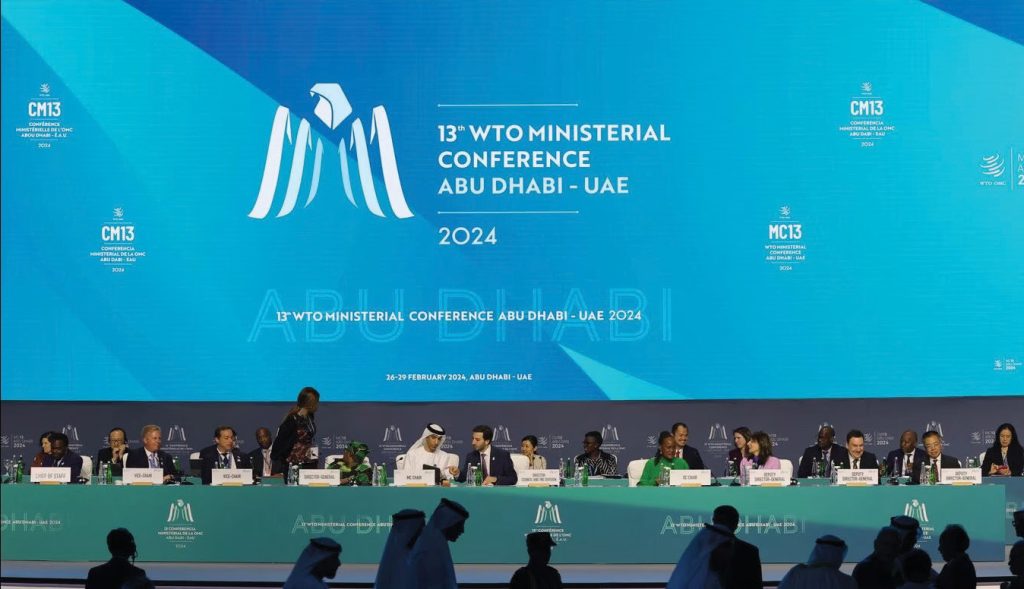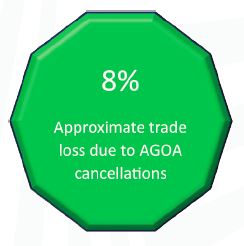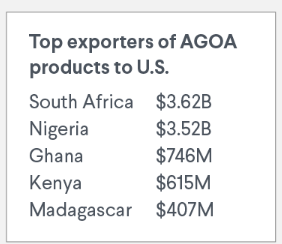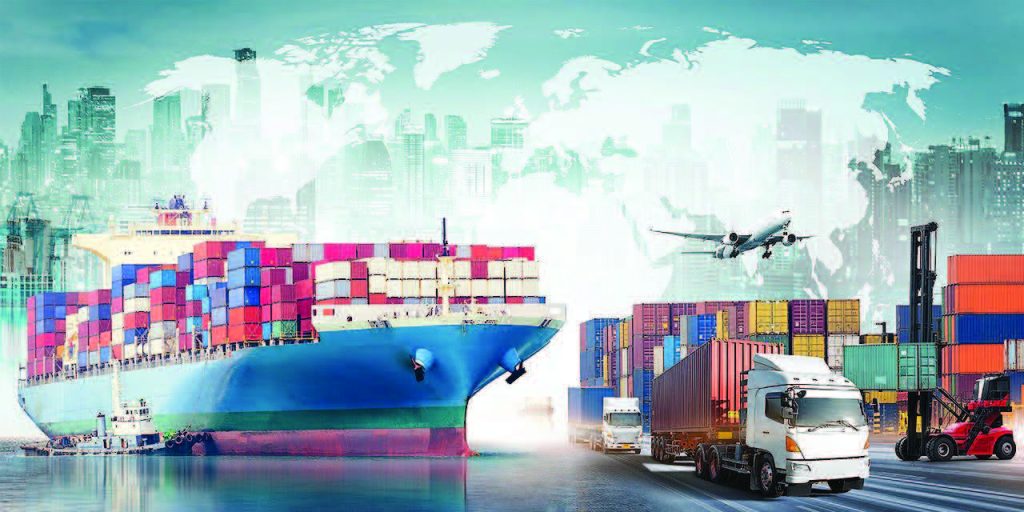
The last few months of 2023 came with good news on Africa’s prospects for vitalized international trade with major G7 economies. In November 2023, the US released the African Growth and Opportunities Act (AGOA) renewal Act[1] which if approved will extend the preferential duty-free export access to the US market to 2040 for 32 African states. A month earlier, Kenya’s minister for Trade, Rebecca Miano, participated at the annual summit of G7 trade ministers giving Africa an important platform for Africa’s trade diplomacy advocacy with the G7. As Kenya’s trade minister affirmed,[2] Kenya participated on behalf of Africa and used the platform to champion Africa’s call for a fairer multilateral trading system. Finally, in the final week of February 2024, the 13th World Trade Organization (WTO) Ministerial Conference (MC13) was held in Abu Dhabi with trade, investment, agriculture, and WTO reform as key agenda items. All these developments highlight a consensus and momentum in affirming the role of trade in economic development. As the G7 Ministers’ statement in October 2023 put it, ‘trade can be a powerful driver of sustainable economic development and poverty reduction. We also support a more significant role for low and middle-income countries in supply chains in a way that also promotes their diversification and local value creation and benefits local workers and communities’.
 These developments denote opportunities for African states through the African Continental Free Trade Agreement (AfCFTA), to assert their leverage on both multilateral as well as bilateral trade agreements that champion links between Africa-based production, Africa’s global trade expansion and jobs creation. As the discourse on trade and development shifts away from tariffs towards a renewed focus on greening trade, value chains and export diversification, African states individually and collectively through AfCFTA thus have an important role to define and champion what emerging global north-south trade pacts should entail. Moreover, there is need to inform substance of what ‘reforming the WTO’ really means.
These developments denote opportunities for African states through the African Continental Free Trade Agreement (AfCFTA), to assert their leverage on both multilateral as well as bilateral trade agreements that champion links between Africa-based production, Africa’s global trade expansion and jobs creation. As the discourse on trade and development shifts away from tariffs towards a renewed focus on greening trade, value chains and export diversification, African states individually and collectively through AfCFTA thus have an important role to define and champion what emerging global north-south trade pacts should entail. Moreover, there is need to inform substance of what ‘reforming the WTO’ really means.
This commentary outlines ideas for rethinking trade for development in Africa beyond the 13th WTO Ministers Conference.
 As AFCFTA spearheads trade expansion within Africa and externally, the impact of African trade agreements needs to be re-thought in a manner that addresses three key challenges affecting African trade. The first problem relates to the potential vulnerabilities brought about by external trade dominated by Generalized Systems of Preferences (GSPs) such as the US’s AGOA and EU’s Everything But Arms (EBA). The second relates to the implications of the North states’ greening policies and the third relates to the role of trade facilitation in enhancing export capacity for African exporters at a business level.
As AFCFTA spearheads trade expansion within Africa and externally, the impact of African trade agreements needs to be re-thought in a manner that addresses three key challenges affecting African trade. The first problem relates to the potential vulnerabilities brought about by external trade dominated by Generalized Systems of Preferences (GSPs) such as the US’s AGOA and EU’s Everything But Arms (EBA). The second relates to the implications of the North states’ greening policies and the third relates to the role of trade facilitation in enhancing export capacity for African exporters at a business level.
One, there is need to moderate the centrality of GSPs. African states need to insulate their trade from the political vicissitudes of preferential trade agreements like EU’s Everything But Arms (EBA) and US’s AGOA. For example, currently, 40% of Sub-Saharan Africa-US trade is hinged on AGOA alone accounting for $12.1 billion of the collective $30 billion exports from AGOA eligible states.
| Country | Change over 3 Years | Cumulative decline in exports | |
| Burkina Faso | US$1650 (2020) | 0 US$ (2023) | 1650 |
| Guinea | US$363 (2021) | 0 US$ (2023) | 363m |
| Ethiopia | US$277m (2021) | 0 US$ (2023) | 277m |
| Mali | US$232 (2021) | 0 US$ (2023) | 232m |
| Gabon | US$125m (2022) | US$ 12m (2023) | 113m |
| Niger | US$ 47m (2021) | 0 US$ (2023) | 47m |
| Rwanda | US$ 52m (2022) | US$ 38 (2023) | 14m |
| Total | US$2696m | ||
AGOA Exports Decline between 2020- 2023
Source: www.AGOA.info – tralac’s online AGOA information portal 2024
At the same time, 12 African states are currently suspended from exporting to the US through AGOA, marking substantial declines in general exports and concomitantly, development. Ethiopia and Burkina Faso are the biggest casualties, but for 2024 onwards we can expect declines for Uganda, Gabon, Mali and other states. Revocation from AGOA is generally informed by among other gaps in the rule of law, human rights and labour standards. As statistics from Tralac show, in the past three years, Africa has lost close to USD 3 billion due to these AGOA cancellations. This translates to 8% trade loss of the $12.1 billion that is generated by AGOA exports.
An even more ominous cloud always hangs on these exports based on AGOA’s 15-year cycle. How does Africa insulate itself from this cycle of uncertainty?
Ultimately, AfCFTA needs to activate a post-AGOA WTO compliant agenda for African states that seeks to safeguard export declines arising from GSPs related cancellations.

The safest way of doing this is through WTO compliant agreements. Championing trade fairness is a big endorsement for the WTO and thus African states through AfCFTA must accept and seek avenues for a gradual but definitive graduation from GSPs based trade. While GSPs provide tempting avenues for non-reciprocal trade, they expose African states trade to the mercurial unilateral power play of powerful states. One of the solutions that some countries are already effecting is to seek WTO governed trade agreements that allow them to graduate from GSPs on their own terms.
The second issue for African states insulation of their trade regards the extent to which African trade agreements, national production and trade policies are aligned with global and regional climate goals. This matters because Africa’s trade and investment future hinges on its climate compatibility objectives with Europe and North America. The implications of Northern states’ greening policies will affect African state’s ability to export there as well as their ability to receive investment from those regions. The most prominent example of nascent greening norms is the European Union’s Carbon Border Adjustment Measures (CBAM). The European Union has for decades been ahead in leadership on climate change mitigation, but their latest greening initiative may pose serious ramifications for Africa’s ability for compliance in exports as well as potential impacts on investment attraction. The bloc is currently in the early phases of implementing the CBAM as a new customs tax intended to ensure a fair price on goods produced using carbon intensive process and to prevent the migration of such industries to areas of low emission regulation. So far, only six industries are targeted namely; cement, steel/Iron, fertilizers, hydrogen, aluminum and electricity but those could be expanded in the future. The EU is within its right to adopt environmentally friendly policies although lots of the CBAM target industries remain in the north. But for Africa, the question that CBAM raises are a bit more complex. If one assumes that African industrialization is pegged on a flying geese North-South transfer of sunset industries, then the question of CBAM’s de-industrialization effect starts to become apparent. The African Development Bank has estimated that Africa could lose US$ 25 billion annually as a result of this tax. As the AfDB president
| Cement | Iron Steel | Fertilizer | |
| 1 | China- 20% | China – 12.4% | Russia- 13.1% |
| 2 | Germany- 13.2% | Japan- 6.34% | Canada- 10.2% |
| 3 | US- 7.7% | Korea – 5.14% | China- 8.9% |
Top CBAM Industries exporting states hold on global exports. Source: OEC.world/en
has put it, ‘with Africa’s energy deficit and reliance mainly on fossil fuels, especially diesel, the implication is that Africa will be forced to export raw commodities again into Europe, which will further cause de-industrialisation of Africa’. WTO global negotiations must therefore introduce a clarity on global environmental regimes which are not essentially anti-trade.

From a WTO perspective, there is need to ensure that states greening policies are not -at heart- protectionist. From an African perspective there is need to ensure capabilities for national compliance with these emerging greening objectives. A two-pronged approach that empowers WTO to reign on green protectionism is needed, while countries work on enhancing compliance to global climate standards.
If green protectionism is arrested and African trade insulated from GSPs- what then will be the main tool for trade and development? As a recommendation, this is where value chain approach for trade facilitation comes in. Trade facilitation targets all constrains that reduce cost and time of trading and has traditionally tended to focus on capacity development for state agencies involved in cross border trade. AfCFTA needs to push for a multilateral embrace of the scope of value chain support within a trade facilitation framework where the recipient of trade support is not a state body. The objective should be to ensure that a value chain approach to trade facilitation is not open to subsidy litigation.
In conclusion, as Africa moves on from the recently concluded 13th WTO Ministerial Conference, there is need to develop a continental agenda for MC14 around WTO frameworks for arresting green protectionism, diminishing role of GSPs in African trade and cementing an actionable WTO compliant agreement on a value chain approach to trade facilitation.
Elijah Munyi is the Policy Writer and Research Manager at Trademark Africa. The opinion expressed here are his alone and do not reflect the position of Trademark Africa.
[1] Senator Coons releases draft of AGOA reauthorization act to deepen U.S.-Africa economic relationship
[2] G7, Africa collaboration is key to an inclusive global trade, growth system
